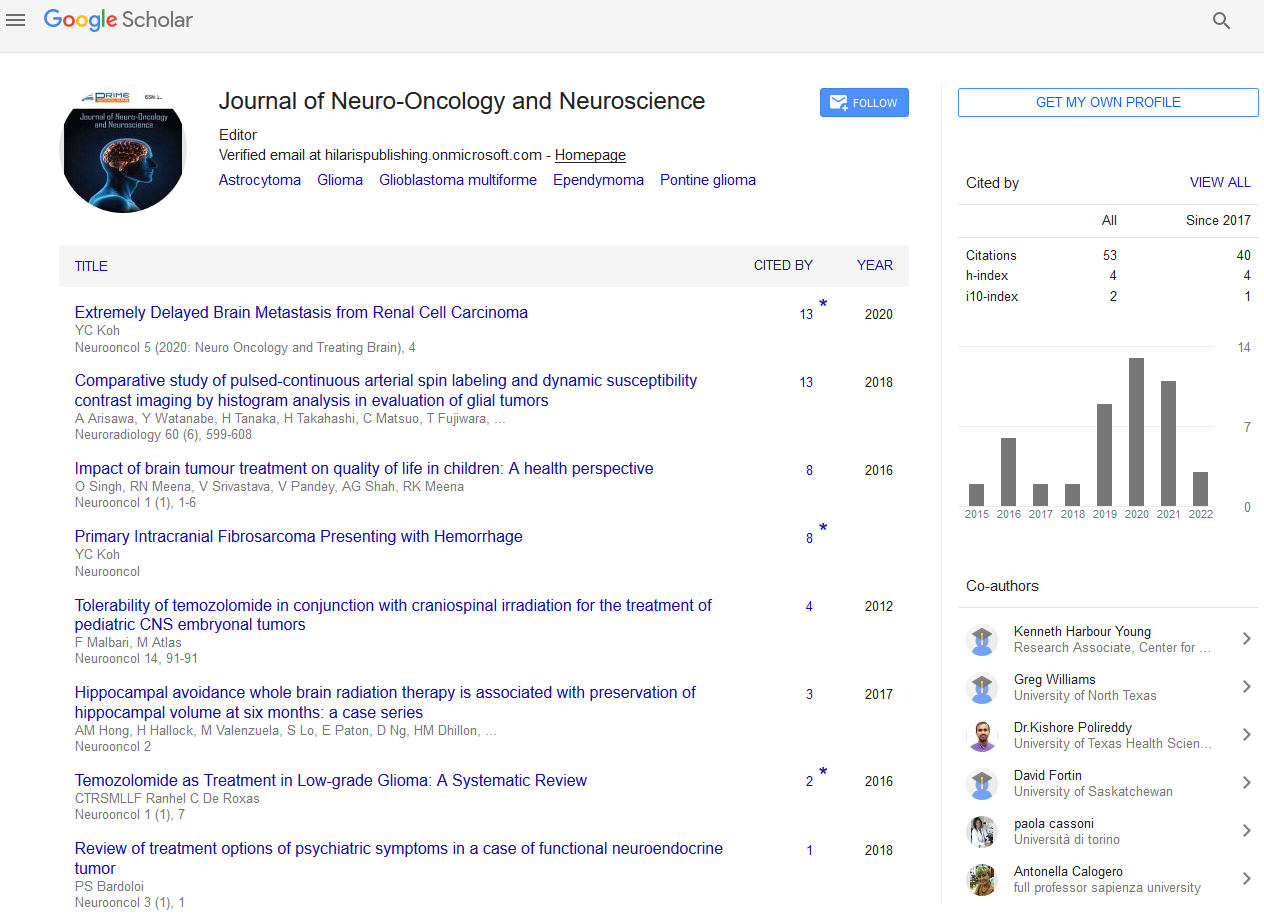Commentary Article - (2023) Volume 8, Issue 2
Understanding Brain Metastasis: A Complex Challenge in Cancer
Maxwell Robert*
Department of Molecular and Integrative Biology, Liverpool, UK
*Correspondence:
Maxwell Robert,
Department of Molecular and Integrative Biology, Liverpool,
UK,
Email:
Received: 31-May-2023, Manuscript No. IPJNO-23-17966;
Editor assigned: 02-Jun-2023, Pre QC No. IPJNO-23-17966 (PQ);
Reviewed: 16-Jun-2023, QC No. IPJNO-23-17966;
Revised: 21-Jun-2023, Manuscript No. IPJNO-23-17966 (R);
Published:
28-Jun-2023, DOI: 10.21767/2572-0376.8.2.013
Description
Cancer, a formidable adversary in the world of medicine, exhibits
its deadliest potential when it spreads to distant organs.
One of the most intricate and devastating manifestations of
this metastatic journey is brain metastasis. Brain metastasis
occurs when cancer cells from a primary tumor elsewhere in
the body travel to the brain, where they establish secondary
tumors. This phenomenon presents a significant clinical challenge,
as it drastically reduces a patient’s quality of life and often
has a grim prognosis. In this article, we will delve into the
complexities of brain metastasis, exploring its causes, diagnosis,
treatment, and the ongoing research efforts to combat this
formidable foe.
The journey of cancer cells to the brain involves a series of intricate
steps, each presenting formidable hurdles. The process begins
when cancer cells from a primary tumour site, such as the
lung, breast, or colon, gain the ability to break away from the
tumour and enter the bloodstream or lymphatic system. Once
in circulation, these wandering cells must navigate through the
bloodstream, survive the mechanical and immune challenges,
and eventually reach the brain. Upon arrival in the brain, they
must traverse the blood-brain barrier, a protective layer of cells
that limits the passage of substances from the bloodstream
into the brain tissue. This barrier serves as a significant obstacle
for cancer cells, making brain metastasis a relatively rare
occurrence compared to other forms of metastasis.
Brain metastasis can manifest in various ways, depending on
the location and size of the tumors. Common symptoms include
headaches, seizures, cognitive impairment, weakness,
and changes in behavior or personality. The diagnostic process
typically involves imaging studies like MRI or CT scans, which
can reveal the presence and extent of brain metastasis. In
some cases, a biopsy may be necessary to confirm the diagnosis
and determine the primary source of cancer. Once brain
metastasis is diagnosed, the treatment approach depends on
several factors, including the primary cancer type, the number
and size of brain metastases, and the overall health of the patient.
Treatment options for brain metastasis include surgery,
radiation therapy, chemotherapy, targeted therapy, immunotherapy,
or a combination of these modalities.
Surgery may be employed to remove accessible and isolated
brain metastases, aiming to relieve symptoms and improve the
patient’s quality of life. However, not all brain metastases are
surgically treatable due to their number or location. Radiation
therapy, including stereotactic radiosurgery, is often used to
target and destroy brain metastases while preserving healthy
brain tissue. This approach is particularly effective for small or
inaccessible tumors.
Chemotherapy, targeted therapy, and immunotherapy are systemic
treatments that can be used to control cancer both in the
brain and the rest of the body. However, the effectiveness of
these therapies in treating brain metastasis varies depending on
the cancer type and specific molecular characteristics. Despite
advances in cancer research and treatment, brain metastasis
remains a formidable challenge. The blood-brain barrier limits
the efficacy of many systemic therapies, making it difficult to
treat brain metastasis effectively. Additionally, the genetic and
molecular characteristics of cancer cells in the brain may differ
from those in the primary tumour, further complicating treatment
decisions. On-going research efforts are focused on improving
our understanding of brain metastasis and developing
targeted therapies that can penetrate the blood-brain barrier.
Scientists are also investigating immunotherapies and combination
treatments that harness the immune system’s power to
combat brain metastasis.
Acknowledgement
None.
Conflict Of Interest
The author’s declared that they have no conflict of interest.
Citation: Robert M (2023) Understanding Brain Metastasis: A Complex Challenge in Cancer. Neurooncol. 8:013.
Copyright: © 2023 Robert M. This is an open-access article distributed under the terms of the Creative Commons Attribution License, which permits unrestricted use, distribution, and reproduction in any medium, provided the original author and source are credited.

